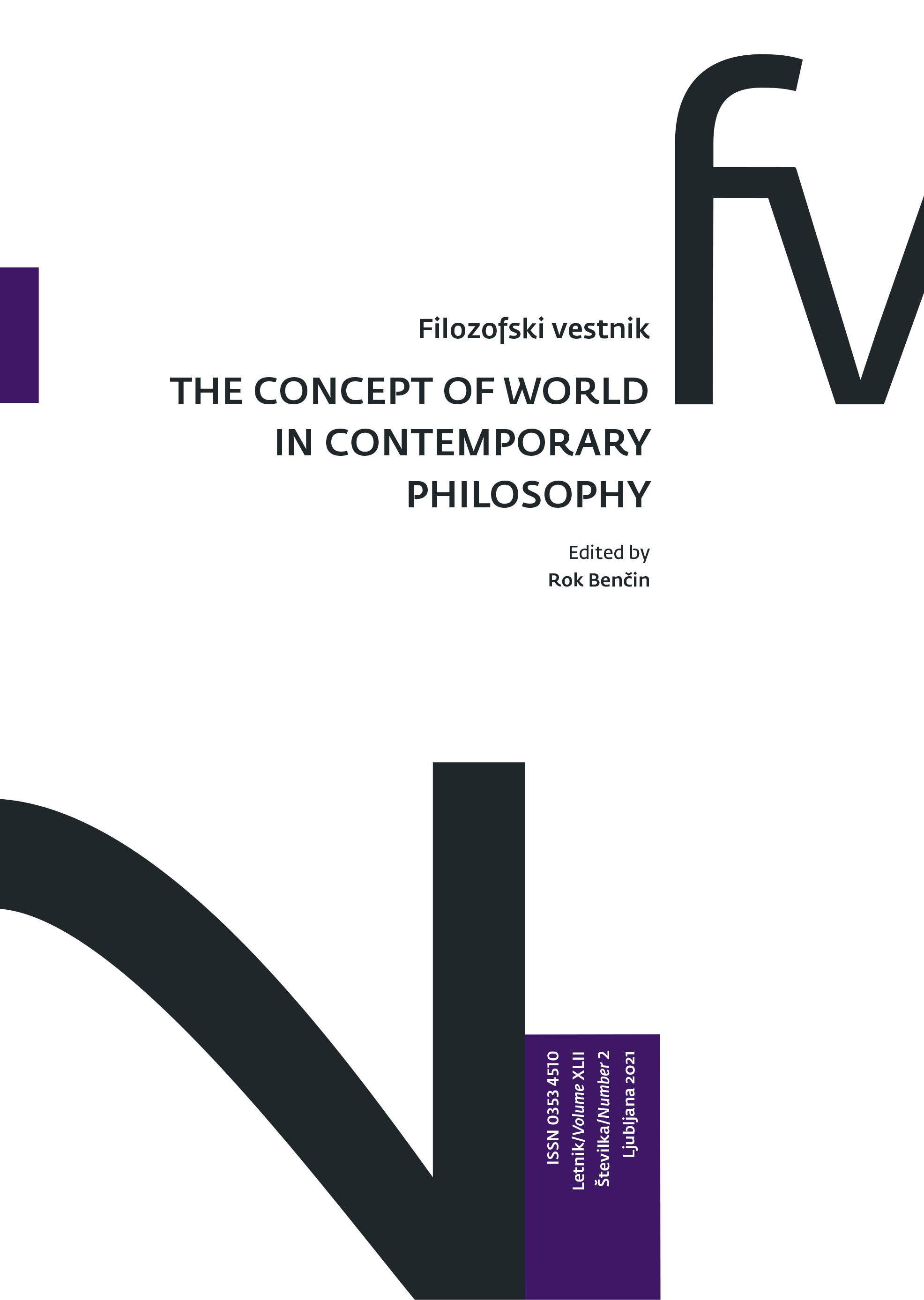On Acosmic Realism
DOI:
https://doi.org/10.3986/fv.42.2.04Keywords:
Weltschmerz, Weltliteratur, Benjamin, acosmism, speculative realism, Meillassoux, HarmanAbstract
In order to be able to raise the question of the “world” today in an effective way, we have to reactivate the Goethean categories of Weltliteratur and Weltschmerz for a critique of our own historical moment. We need to understand the phenomenon of Weltschmerz as a symptom of the impossibility of Weltliteratur. Going beyond the context of the original formulation of these categories, we could argue that something akin to the historical phenomenon of Weltschmerz emerges every time the ideological constitution of the world threatens to fail. Today, we live in an age of a generalised state of cultural disorientation that has produced its own Weltliteratur, which includes a wide range of discourses about the “world” – from officially endorsed theories of economic globalisation, to scientific treatises on the Anthropocene, environmental protest movements, philosophical pamphlets, all the way to world-historical conspiracy theories. Yet, an anxiety concerning the impossibility of world-formation in general is also recorded in these documents. In order to be able to capture our contemporary Weltschmerz, the article turns to the young Walter Benjamin’s suggestion that the task of this age is to produce an “objective” (rather than subjective) Weltschmerz. However, the most effective tools to conceptualise this objective Weltschmerz come from the traditions of philosophical acosmism. It is a notable philosophical development of our times that some elements of the acosmic tradition have recently resurfaced in speculative realism. Thus, speculative realism could be described as a possible site of our contemporary Weltschmerz: its acosmic metaphysics is repeatedly tamed by a mournful longing for the world.
Downloads
References
Apter, Emily, Against World Literature, New York, Verso, 2013.
Arendt, Hannah, The Life of the Mind, New York, Harcourt, 1981.
Beiser, Frederick C., Weltschmerz: Pessimism in German Philosophy, 1860-1900, Oxford, Oxford University Press, 2016.
Benjamin, Walter, Selected Writings, Vol. 1, 1913-1926, M. Bullock and M. W. Jennings (eds.), Cambridge, MA, Harvard University Press, 1996.
Benjamin, Walter, Selected Writings, Vol. 2, 1927-1934, M. W. Jennings, H. Eiland, and G. Smith (eds.), Cambridge, MA, Harvard University Press, 1999.
Benjamin, Walter, Early Writings 1910-1917, H. Eiland (ed.), Cambridge, MA, Harvard University Press, 2011.
Brod, Max, “Der Dichter Franz Kafka”, Neue Rundschau, November 1921, pp. 1210–1216.
Cheah, Pheng, What is a World? On Postcolonial Literature as World Literature, Durham, Duke University Press, 2016.
Danowski, Déborah, and Eduardo Viveiros de Castro, The Ends of the World, trans. R. Nunes, Cambridge, Polity, 2017.
Gabriel, Markus, Why the World Does Not Exist, trans. G. Moss, Cambridge, Polity, 2017.
Harman, Graham, The Quadruple Object, Winchester, Zero Books, 2011.
Latour, Bruno, Down to Earth: Politics in the New Climatic Regime, trans. C. Porter, Cambridge, Polity, 2018.
Meillassoux, Quentin, After Finitude: An Essay on the Necessity of Contingency, trans. R. Brassier, London, Continuum, 2008.
Meillassoux, Quentin, “Excerpts from L’Inexistence divine”, trans. G. Harman, in Graham Harman, Quentin Meillassoux: A Philosophy in the Making, Edinburgh, Edinburgh University Press, 2011.
Meillassoux, Quentin, “Iteration, Reiteration, Repetition: A Speculative Analysis of the Sign Devoid of Meaning”, trans. R. Mackay and M. Gansen, in S. Malik and A. Avanessian (eds.), Genealogies of Speculation: Materialism and Subjectivity since Structuralism, London, Bloomsbury, 2016.
Meyer-Sickendiek, Burkhard, “Weltschmerz”, in C. Rohde, T. Valk, and M. Mayer (eds.), Faust Handbuch: Konstellationen, Diskurse, Medien, Stuttgart, J. B. Metzler Verlag, 2018, pp. 254–261.
Rubenstein, Mary-Jane, Worlds without End: The Many Lives of the Multiverse, New York, Columbia University Press, 2014.
Ruda, Frank, “The Speculative Family, or: Critique of the Critical Critique of Critique”, Filozofski vestnik, 33 (2/2012), pp. 53–76.
Schütte, Hans-Walter, “Akosmismus” in Historisches Wörterbuch der Philosophie, Vol. 1, J. Ritter, K. Gründer, and G. Gabriel (eds.), Basel, Schwabe, 1971, col. 128.
Sloterdijk, Peter, Critique of Cynical Reason, trans. M. Eldred, Minneapolis, University of Minnesota Press, 1987.
Sloterdijk, Peter, After God, trans. I. A. Moore, Cambridge, Polity, 2020.
Steyerl, Hito, Duty Free Art: Art in the Age of Planetary Civil War, New York, Verso, 2019.
Weber, Philipp, Kosmos und Subjektivität in der Frühromantik, Leiden, Wilhelm Fink Verlag, 2017.
Weber, Philipp, “Romantic Acosmism: On Friedrich Schlegel’s Theory of an Unfinished World”, The Germanic Review, 96 (1/2021), pp. 23–40.
Žižek, Slavoj, The Ticklish Subject: The Absent Centre of Political Ontology, New York, Verso, 2000.
Downloads
Published
Versions
- 2022-04-06 (2)
- 2021-12-31 (1)
How to Cite
Issue
Section
License
Authors guarantee that the work is their own original creation and does not infringe any statutory or common-law copyright or any proprietary right of any third party. In case of claims by third parties, authors commit their self to defend the interests of the publisher, and shall cover any potential costs.
More in: Submission chapter





